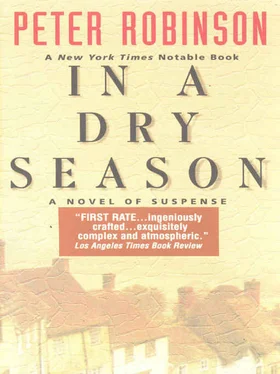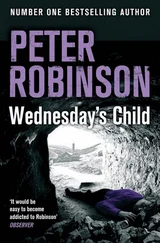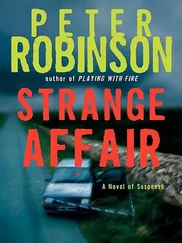As vividly as if it were yesterday, he remembered the late-May afternoon when he drove his ailing VW beetle to Cambridgeshire in search of Jem’s parents. He didn’t even know why he was making the journey, and more than once he thought of turning back. What could he say? What right had he to intrude on their grief? After all, he had hardly known Jem, knew nothing about his life. On the other hand, they had been friends, and now his friend was dead. The least he could do was offer his condolences and tell them they had a son they should be proud of, no matter how ignominious his death.
Besides, he was curious to see what sort of background Jem came from.
It was a fine day and Banks drove with his window down through the North London suburbs and into open countryside, the wind blowing through his hair, which at that time was well over his collar. He turned off the main road just south of Cambridge. A number of images of the drive came back: Tim Buckley on the radio singing “Dolphins” just outside Saffron Walden; a whitewashed pub wall; a herd of cows blocking the road as they were moved, udders swinging, from field to field by a slow farmer, unconcerned about the minor traffic jam he was causing; the air smelling of warm straw and manure.
Banks stopped in the village newsagent’s and asked for directions to the Hylton house. The shopkeeper looked suspicious, as if she thought he was out to rob the place, but she told him. The house – mansion, rather – stood at the end of an unpaved drive about half a mile from the village center. It was originally Tudor, by the look of it, but was crusted with so many centuries of additions, like barnacles on the bottom of a boat – a conservatory here, a garage there, a dormer window – that it seemed on the verge of buckling under its own weight.
Banks sat in his car and stared for a moment, hardly able to take in that this was where Jem came from. He stubbed out his cigarette. The area was quiet, except for a few birds singing and the sound of someone talking on a radio deep inside the house. Surely they must have heard him arrive? Especially with the odd hiccuping sounds his beetle was making those days.
Banks got out of the car and looked around. Beyond a neatly trimmed croquet-size lawn the land dipped away, revealing a patchwork landscape of green and brown fields under a canopy of blue sky as far as the eye could see. A few small copses and a church steeple were all that broke the monotony. This was the old England, the place of order, of the laborer at work in the fields and the lord at ease in his manor. It was a far cry from Peterborough and Notting Hill. Banks had visited the countryside before, of course, but he had never been to a house so opulent, had never known anyone who came from such a house. The old class insecurities began to surface, and if he had been wearing one, he would probably have knocked on the door cap in hand. He felt self-conscious of his accent even before he opened his mouth.
A sweet-smelling honeysuckle bush stood beside the old oak door, and Banks could hear the bees droning around the blossoms. He banged the heavy knocker against the wood. The sound echoed through the countryside and sent a nearby flock of starlings flapping off into the sky.
It seemed forever before Banks became aware of someone approaching the door, a creak of a floorboard perhaps, or swish of a skirt. When it opened a crack, he found himself looking at a dark-haired woman with high cheekbones and sunken brown eyes. She seemed old to him back then, when he had hardly turned twenty, but he realized that she was probably only in her early forties, about the same age he was now.
She raised an eyebrow. “Yes? What is it?”
“Mrs. Hylton?”
“I’m Mrs. Hylton. What can I do for you?”
“I’ve come about Jem?”
She frowned. “Who?”
“Jem. Sorry: Jeremy. Your son.”
A man appeared behind her, and she opened the door all the way. He had white hair, a red face, and watery pale blue eyes. “What is it, darling?” he asked, putting his hand on the woman’s shoulder and frowning at Banks. “Who is he? What does he want?”
She turned to her husband with a puzzled expression on her face. “Someone come about Jeremy.”
Banks introduced himself. “I lived across the hall from Jeremy in Notting Hill,” he said. “We were friends. I just wanted to come and say I’m sorry about what happened.”
“I don’t understand,” said the man. “Our son died a long time ago. It’s a bit late to be coming round with condolences, don’t you think?”
“Jem? Jeremy Hylton? I am at the right house, aren’t I?”
“Oh, yes,” said the woman. “But the thing is, our Jeremy died five years ago.”
“But… but it was only about a month ago. I mean, I knew him. I found him. We are speaking about the same person, aren’t we? Did Jeremy have a brother, perhaps?”
“We had only one son,” the man said. “And he died five years ago. Now, if you don’t mind, I think my wife has been disturbed enough, don’t you? Good day.”
He started to close the door.
Banks made one last-ditch attempt. He stuck his foot in the door and said, “Please, you don’t understand. Jem died last month. I don’t mean to upset you, but-”
Mr. Hylton opened the door a fraction and Banks slipped his foot out. “If you don’t go away and get off our property immediately, I’m going to call the police,” he said. “Is that clear?” And this time he slammed the door shut before Banks could move.
For a few moments, Banks stared at the weathered oak, his mind spinning. He saw a curtain move and assumed they were watching, ready to phone the police, so he got in his beetle, turned and drove away.
At the end of the drive, an elderly man wearing a cloth cap waved him down. Banks stopped, and the man leaned down to the open window. He had about five days’ growth on his cheeks, and his breath smelled of beer. “What you been bothering them there for, then?” he asked.
“I wasn’t bothering them,” Banks said. “I just came to offer them my condolences on their son’s death.”
The man scratched his cheek. “And what did they say?”
Banks told him, all the time glancing in his mirror to see if the Hyltons had followed him down the drive.
“Well,” the man said, “see, as far as they’re concerned, their Jeremy died the day he dropped out of university and went off to London to be one of them drug-smoking hippies.” He scrutinized Banks for a moment, as if trying to make up his mind where he fit in the scheme of things. “I noticed they had the police around a while back and wondered what it were all about. Jeremy’s really dead now, then?”
“Yes,” said Banks after another quick glance in the mirror.
“Drugs, were it?”
“Looks that way.”
“I’m sorry to hear it. I’ve known him since he were a babe in arms. Nice young lad he were till he went bad. He were going to be a doctor, like his dad. At Cambridge he was you know. I don’t know what went wrong.” He pointed with his thumb back at the house. “They never recovered. Don’t talk to anyone. Don’t have any visitors.” He shook his head slowly. “Poor little Jeremy. They never even gave him a funeral service.” Then he wandered away along the road shaking his head and muttering to himself.
Banks was left alone at the intersection of the drive and the road, with only the birdsongs and his own gloomy thoughts of estrangement and denial for company. He had a pretty good idea of what went wrong for Jem, having read Clara’s letter, but it seemed that nobody wanted to know.
Horns blaring on Market Street broke into his reminiscences. Now he had another denial on his mind. Jem’s parents had convinced themselves their son had died five years before he really did, just because he had disappointed their expectations. Gwen Shackleton told George and Francis Henderson that Gloria had run away when she was well aware that Gloria was actually dead and buried out back. Somehow, the two denials seemed like curious mirror images to Banks.
Читать дальше












